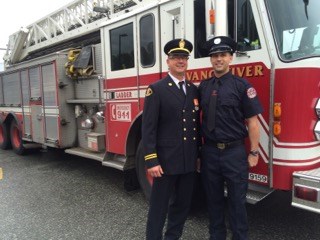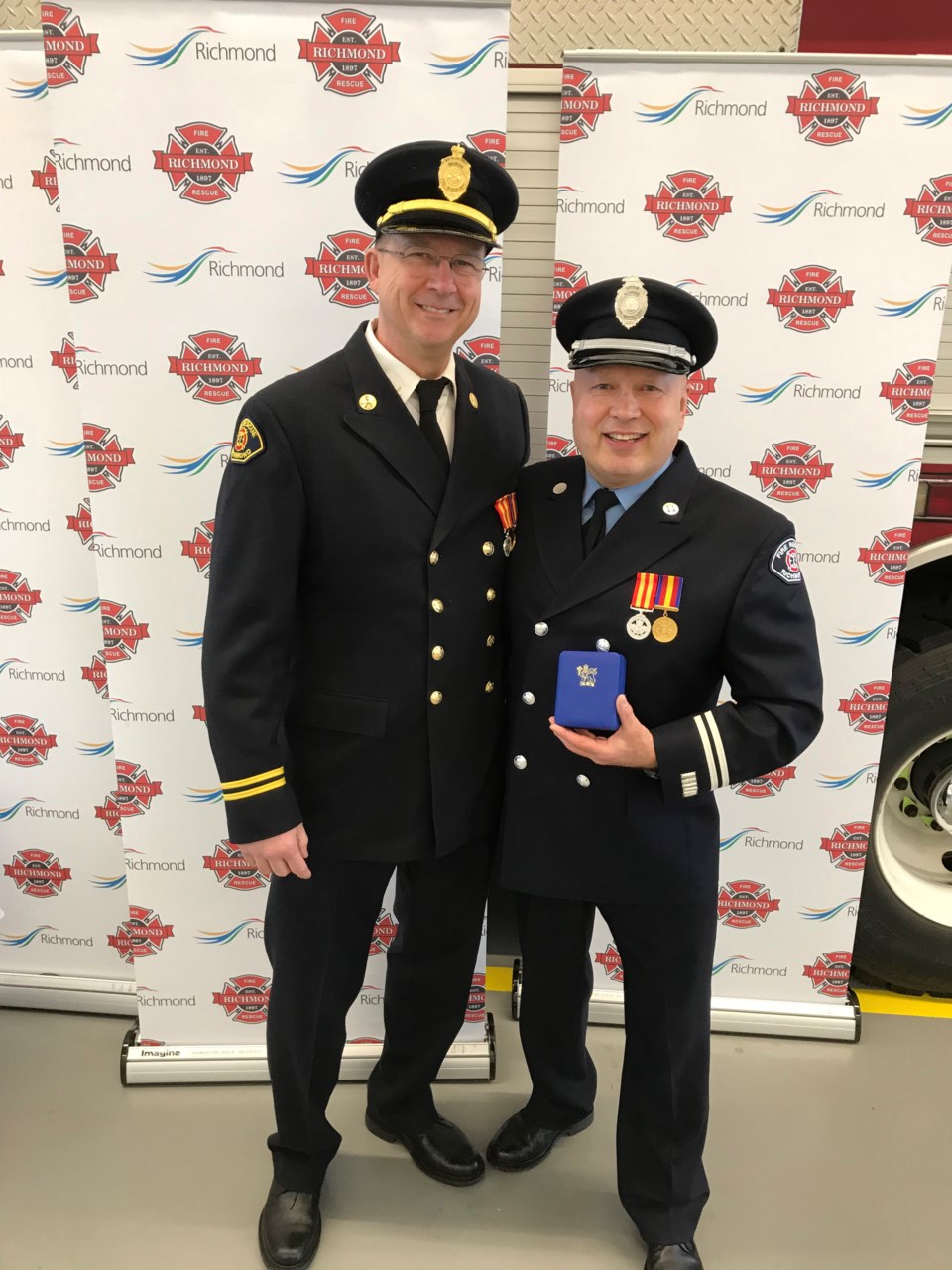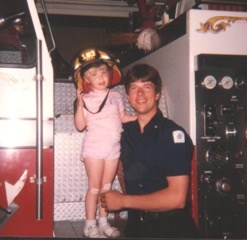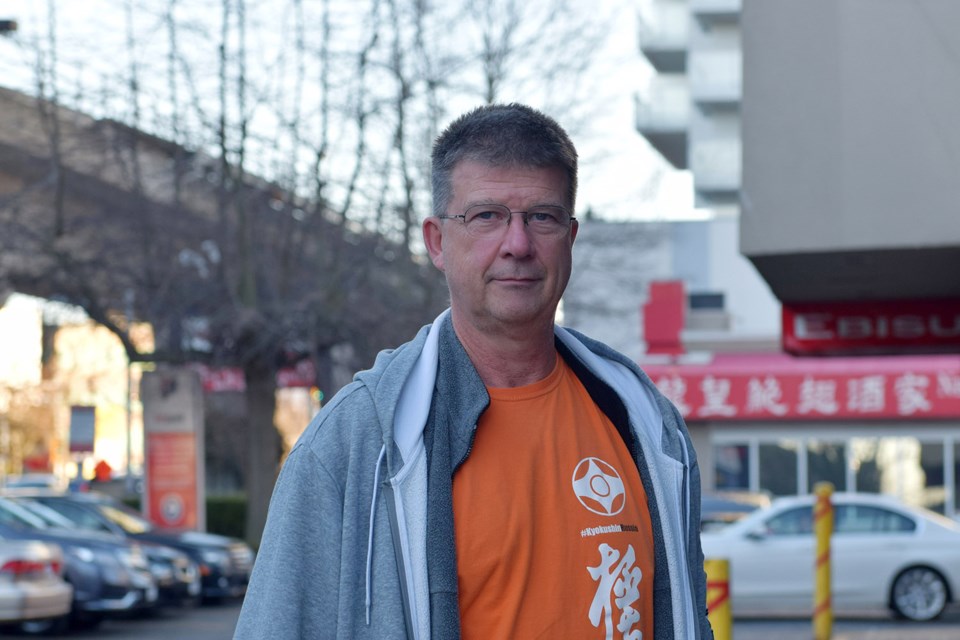Leo van den Boogaard can’t watch his grandkids while they swim. He’s hypervigilant, attuned to every possible danger surrounding the pool.
The 60-year-old retired battalion chief says it’s because of his post-traumatic stress disorder. Twenty-eight years ago, when he was a much younger firefighter, he responded to a drowning call.
The motionless toddler who had jumped into a backyard pool was the spitting image of his then-three-year-old daughter.
Over the years, he’s responded to other traumatic calls that have left lasting scars. When the late Const. Jimmy Ng was hit by a street racer, van den Boogaard was one of the first on scene. He performed CPR.
“Your brain takes trauma and files it. Files it until that file container is full,” van den Boogaard said. “When your file box gets so full, you can’t shut it (your mind) off when you leave (work).”
That led to isolating himself from his family, suicidal thoughts and panic attacks at work that sent him to the emergency room.
He was diagnosed with PTSD and major depression in 2013.

These illnesses are more common in first responders than the general population, partly because they’re exposed to horrific scenes more frequently. A 2017 study found that 45.5 per cent of nearly 6,000 Canadian public safety personnel surveyed screened positive for clinically significant symptoms of a mental illness.
But even though research shows firefighters are more at risk for mental illnesses like PTSD, the City of Richmond has challenged workplace mental health injury claims by its firefighters, even after presumptive legislation was introduced this year. Presumptive legislation means a first responder doesn’t have to prove their mental illness is work-related — that is simply presumed to be the case.
However, van den Boogaard said getting WorkSafe and the city to accept his PTSD was work-related was “a fight from the word go.”
He went off work from 2013 to 2015, and after months of back-and-forth negotiations, WorkSafeBC accepted his PTSD claim. Therapy gave van den Boogaard coping mechanisms, and he felt ready to return to work in 2016.
But 10 months after that, his symptoms worsened. Van den Boogaard left work again, and tried to re-open his WorkSafeBC claim. The city sent him to a doctor for an independent psychiatric evaluation in the summer of 2017, after he’d been off work for six months. Such is standard practice in van den Boogaard’s collective agreement.
Like two independent medical evaluators before, this doctor found van den Boogaard suffered from PTSD and depression. The doctor cautioned that a return to work would likely “increase the frequency of symptoms.”
Then, documents came from the city’s law firm Harris & Company LLP, arguing the symptoms were not directly caused by his work, and so the claim should not be re-opened.
Van den Boogaard was astonished the city would pay the large, downtown Vancouver law firm to argue that symptoms outlined in the $5,000 medical report the city itself had commissioned were not caused by his firefighting job.
Statement of Financial Information documents for the city of Richmond indicate the municipality spent hundreds of thousands of dollars retaining the workplace law firm every year for the past three years. They spent $356,739 in 2017, $287,822 in 2016 and $395,918 in 2015. It’s unclear how much of that went toward challenging mental health claims by firefighters, and city spokesperson Ted Townsend declined to elaborate, saying the information was confidential.
“The city cannot comment on specific matters pertaining to personnel issues as we have a legal obligation to protect the privacy of employees, regardless of whether or not they choose to share such information,” Townsend wrote in an email.

During the latest WorkSafeBC proceedings, Van den Boogaard represented himself.
“I felt intimidated. Personally, I didn’t think I had a chance. So I thought why am I going to waste money on a lawyer?”
Instead, he wrote an impassioned letter arguing why his PTSD was work-related and not due to family stressors, as the city was arguing.
It’s unclear why van den Boogaard’s union didn’t provide a lawyer for the 2017-2018 proceedings, although it did help him with his initial claim.
The Richmond News has reached out to the union representative, but didn’t hear back before press time.
Regardless, WorkSafeBC ruled in van den Boogaard’s favour in June 2018, accepting that his PTSD and depression were a permanent disability as a result of his previous work-related injury. He was allowed to re-open his claim.
The city responded by asking for a review of the decision. According to a labour lawyer, a review is the first level of an appeal within the workers’ compensation system, and can result in a decision being reversed.
However, the city said it is obliged to conduct a review.
“The city has an obligation to conduct due diligence in reviewing all injury claims to ensure that both the employee and employer’s interests are dealt with fairly and appropriately,” Townsend said.
Townsend added the city and Richmond Fire-Rescue take issues surrounding PTSD very seriously. He said firefighters participate in Critical Incident Stress Management sessions after responding to graphic calls, and take part in mental health training sessions.
The News previously reported on those initiatives in a feature story on a retired firefighter’s suicide.
As for van den Boogaard’s case, it’s unclear why the city asked for a review in June, a month after presumptive PTSD legislation had already been introduced. Conrad Margolis, a Richmond lawyer who works with WorkSafeBC claims, suggested van den Boogaard’s case could have been complicated because he was reopening an existing claim and because his injury occurred before the presumptive changes came into effect.
The saga only ended when van den Boogaard turned 60 in September, the mandatory retirement age for Richmond firefighters. After he submitted his intent to retire, the city withdrew its request for review.
Van den Boogaard considers that timing lucky.
Others, though, aren’t as fortunate. One current firefighter told the News on condition of anonymity that he is still struggling with the city and with WorkSafe to get his PTSD claim accepted.
Margolis said it’s not uncommon for larger employers like municipalities to challenge decisions from the WorkSafeBC that favour injured workers.
Although it’s disheartening to employees, Margolis said “economics drive their (employers’) decisions, not humanity or empathy for injured workers.”
“It may be as simple as their (insurance) premiums go up when the amount of money paid out on WorkSafeBC goes up,” Margolis explained.

Van den Boogaard said it makes him angry when the city says it takes firefighter mental health seriously, given how hard it was for him to get his PTSD claim accepted. But he does acknowledge the situation is getting better for young firefighters.
“The difference is they deal with it right away … You’re going to a mandatory eight sessions with a psychologist. That’s what I needed 25 years ago.”
The shift away from a “macho” culture with a “suck it up attitude” is what makes him confident his son, who’s a Vancouver firefighter, will get the mental health help he needs.
Van den Boogaard said he loved his job because he loved helping people. He’s just sorry it was such a battle to show it caused his PTSD.
“I don’t know if I would have become a firefighter if they’d said ‘oh … 35 years from now you’re going to have PTSD. You’re going to be suicidal and it’s going to be terrible. I don’t know if I would have taken the job.”



